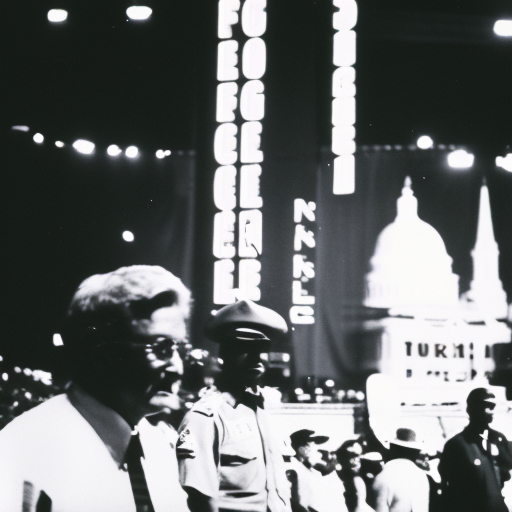Summary: 1960 Democratic National Convention
The 1960 Democratic National Convention was held in Los Angeles, California, from July 11 to July 15, 1960. It was a crucial event in American political history, as it marked the nomination of John F. Kennedy as the Democratic Party’s candidate for the presidency. The convention was also significant for being the first to be widely televised, allowing millions of Americans to witness the proceedings.
Background
The 1960 Democratic National Convention took place during a time of great political and social change in the United States. The country was still recovering from the economic recession of the late 1950s, and the civil rights movement was gaining momentum. The Democratic Party was divided between the more conservative establishment and the emerging liberal wing, which sought to address issues such as racial inequality and poverty.
The Candidates
The two main contenders for the Democratic nomination were John F. Kennedy, a senator from Massachusetts, and Hubert H. Humphrey, a senator from Minnesota. Kennedy was a charismatic and youthful candidate who appealed to the party’s liberal base. Humphrey, on the other hand, represented the more traditional wing of the party and had a strong record on civil rights issues.
The Convention
The convention began with a highly anticipated speech by Kennedy, in which he outlined his vision for the country and called for a new generation of leadership. His speech was well-received and helped solidify his position as the frontrunner for the nomination. However, Humphrey also delivered a powerful speech, highlighting his commitment to civil rights and social justice.
As the convention progressed, it became clear that Kennedy had secured enough delegates to win the nomination. However, there was still some resistance from the more conservative elements of the party, who were wary of his Catholic faith and perceived lack of experience. In an effort to unite the party, Kennedy chose Lyndon B. Johnson, a senator from Texas and a prominent figure in the party’s conservative wing, as his running mate.
The Televised Debate
One of the most memorable moments of the convention was the televised debate between Kennedy and Richard Nixon, the Republican nominee. This was the first-ever televised presidential debate, and it had a significant impact on the outcome of the election. Kennedy’s calm and confident demeanor contrasted with Nixon’s nervousness, and many viewers believed Kennedy came out on top. The debate helped solidify Kennedy’s image as a strong and capable leader.
Legacy
The 1960 Democratic National Convention marked a turning point in American politics. It showcased the power of television as a political tool and set the stage for future conventions to be broadcast to a national audience. Kennedy’s nomination and subsequent election as president represented a shift towards a more progressive and youthful leadership in the Democratic Party.
The convention also highlighted the growing influence of the civil rights movement within the party. While Kennedy’s nomination was seen as a victory for the liberal wing, it also exposed the deep divisions within the party on issues of race and social justice. These divisions would continue to shape American politics in the years to come.
In conclusion, the 1960 Democratic National Convention was a pivotal event in American political history. It marked the nomination of John F. Kennedy as the Democratic Party’s candidate for president and showcased the power of television in shaping public opinion. The convention also highlighted the growing influence of the civil rights movement within the party and set the stage for future political developments.












